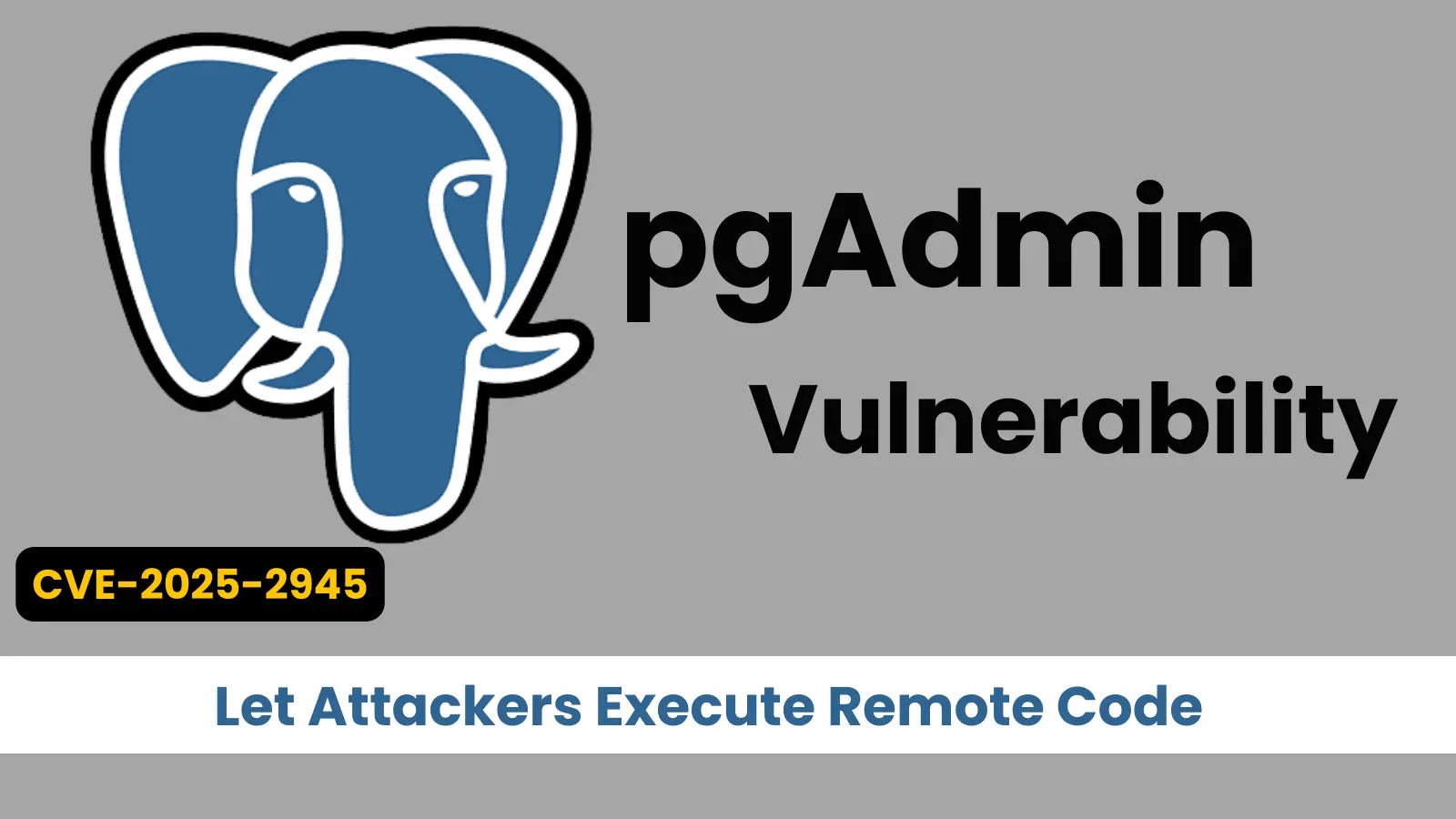pgAdmin 4, the widely adopted open-source management tool for PostgreSQL databases, has recently been found to contain several critical security vulnerabilities. These flaws could allow attackers to execute arbitrary code remotely and bypass authentication mechanisms, posing significant risks to database integrity and system security.
Remote Code Execution Vulnerability (CVE-2025-2945)
A particularly severe vulnerability, identified as CVE-2025-2945, has been discovered in pgAdmin 4 versions prior to 9.2. This flaw enables authenticated attackers to execute arbitrary code on the server by exploiting improper handling of user input in specific endpoints.
Technical Details:
– Affected Endpoints: The vulnerability resides in the `/sqleditor/query_tool/download` and `/cloud/deploy` endpoints. These endpoints improperly pass untrusted user input directly to Python’s `eval()` function without adequate validation or sanitization.
– Exploitation: An attacker with low-privileged authenticated access can craft malicious POST requests to these endpoints, leading to remote code execution. For instance, by manipulating the `query_commited` parameter in the `/sqleditor/query_tool/download` endpoint, an attacker can inject and execute arbitrary Python code on the server.
Potential Impact:
– Data Breaches: Unauthorized access to sensitive data stored in PostgreSQL databases.
– System Compromise: Full control over the server running pgAdmin, allowing for further malicious activities.
– Operational Downtime: Disruption of database services, leading to potential business losses.
Authentication Bypass Vulnerability (CVE-2024-4215)
Another critical issue, CVE-2024-4215, affects pgAdmin versions up to and including 8.5. This vulnerability allows attackers to bypass multi-factor authentication (MFA) mechanisms, granting unauthorized access to the application.
Technical Details:
– Mechanism: An attacker with knowledge of a legitimate user’s username and password can authenticate to the application without completing the MFA process. This is due to improper enforcement of MFA protocols within the affected versions.
Potential Impact:
– Unauthorized Access: Attackers can gain control over the pgAdmin instance, manipulate data, and exfiltrate sensitive information.
– Further Exploitation: Once inside, attackers can potentially launch additional attacks, leveraging the compromised system as a foothold.
Cross-Site Scripting (XSS) Vulnerability (CVE-2024-4216)
In addition to the above vulnerabilities, pgAdmin versions up to 8.5 are susceptible to a cross-site scripting (XSS) flaw, identified as CVE-2024-4216.
Technical Details:
– Affected Component: The vulnerability exists within pgAdmin’s settings API, where insufficient input validation allows attackers to inject malicious scripts.
– Exploitation: By intercepting and modifying specific POST requests, an attacker can inject JavaScript code that executes in the context of the victim’s browser, potentially leading to session hijacking or data theft.
Potential Impact:
– Client-Side Attacks: Execution of malicious scripts in users’ browsers, leading to credential theft or unauthorized actions performed on behalf of the user.
– Spread of Malware: Distribution of malicious payloads to other users interacting with the compromised pgAdmin instance.
Mitigation and Recommendations
To address these vulnerabilities, the pgAdmin development team has released updated versions that patch these security flaws:
– Update to Version 9.2: This release addresses the remote code execution vulnerability (CVE-2025-2945) by removing the unsafe use of the `eval()` function and implementing proper input validation.
– Update to Version 8.6: This version fixes the authentication bypass (CVE-2024-4215) and XSS (CVE-2024-4216) vulnerabilities, enhancing the overall security of the application.
Immediate Actions:
1. Upgrade pgAdmin: Users are strongly advised to update their pgAdmin installations to the latest versions (9.2 or 8.6, as applicable) to mitigate these vulnerabilities.
2. Review Access Controls: Ensure that only authorized personnel have access to pgAdmin and that user permissions adhere to the principle of least privilege.
3. Monitor Systems: Implement robust monitoring to detect any unusual activities that may indicate exploitation attempts.
4. Conduct Security Audits: Regularly audit your systems and applications to identify and remediate potential vulnerabilities proactively.
Conclusion
The discovery of these critical vulnerabilities in pgAdmin 4 underscores the importance of maintaining up-to-date software and implementing comprehensive security measures. By promptly applying the recommended updates and adhering to best practices, organizations can safeguard their PostgreSQL environments against potential threats and ensure the integrity and availability of their data.

